Rachel Held Evans's Blog, page 42
April 30, 2013
Ask Jennifer Knapp...(Response)

So Jennifer Knapp did an amazing job responding to your questions from last week! I am so excited for you to hear what she has to say.
If you were anything like me, you spent many a weekday morning singing along to Jennifer's “Faithful to Me,” “Hold Me Now,” and “A Little More” as you got ready for another day of high school. The Grammy-nominated folk rock musician’s earthy, raw music has always given shape to my hopes and frustrations. Jennifer’s first three albums—Kansas, Lay It Down, and The Way I Am—sold over a million copies. After taking a 7-year hiatus, Knapp announced in September 2009 that she was returning to music. On May 11, 2010 she released her newest album Letting Go with the single "Dive In".
Jennifer spent her Christian music career challenging religious cultural stereotypes both on and off stage. Candid and compassionate in heart, rock-n-roll in her confrontational style, Jennifer’s impact on Christian audiences took a new turn in 2010 when she made public her long-standing same-sex partnership. The revelation sparked much public debate amid cries for immediate rejection from Christian music leaders, retailers and fans alike. Jennifer currently advocates on behalf of LGBT Christians through Inside Out Faith. Having experienced, first hand, the devastating effects of rejection and judgment, Jennifer knows full well the challenges of being “out” in certain faith communities. However, it is in the sharing of her journey through story, music and conversation that she has discovered the healing that comes from breaking the silence.
You asked some fantastic questions, and Jennifer responded with depth, wisdom, and grace. I hope you enjoy the interview as much as I did!
From Ouisi: I picked up your new album a few months ago and love it. You've gone through so much maturation, and the wisdom and pain you sing about sound familiar to me, just like the eager words you sang in the first part of your career sounded when I was in high school. If I understand correctly, your journey took you to a point where you now own the fact that you can't not be gay and you can't not be Christian. For the second part of that - What were some of the moments, the thoughts, the experiences that brought you to the point of claiming your faith as a Christian?
There are times in our lives where we are witness to certain events and happenings that radically alter how we will move about our world. We have experiences where we are forever changed in how we see the world around us, how we see ourselves and how we will react in navigating our individually unique journeys. I am grateful that the Gospel spoke to me in such a way. I saw, I experienced, I left altered by a grace that I knew I could never merit nor repay. To this day, my life has never been the same.
Try as I might, the message of Christ continues to inspire and move me, even when no one is looking, even when others insist that I am “doing it wrong” or not acting ‘Christian enough’. Being in a church every Sunday isn’t why I identify as Christian. It is by my experience in ‘seeing’ Christ I am compelled to act out the mercies given me. I have been introduced to concepts like grace, redemption and love. I am a living, breathing human being whose life has been profoundly changed having experienced these acts first hand.
Over the years I have continued to question what calling myself a ‘Christian’ implies. There’s a lot to unpack there in terms of religion, tradition, history, theology--but honestly, in the end, it doesn’t matter what anyone calls me. I am and continue to be inspired by my experience with Christ. No one can take that away. The moment that any of us allows another human being to push us off of the meaningful experiences in our lives, we begin to erode in spirit.
From Rachel: Jennifer, thank you so much for your music. It's been a big part of my life, and I am so grateful for you. I'll try not to fan out too much as I ask my question: I'm reading a book by pastor Jonathan Martin in which he discusses the fact that, in our current culture, fame and notoriety are treated as necessities, while obscurity is considered the kiss of death. He writes "Our society tells us that if and when we get "there"--the job or position or degree we've always wanted, the notoriety we've always dreamed of--that's when all the important stuff will start happening. Not so. All the good stuff happens in obscurity." Is this how you feel about your seven-year hiatus from the music industry? What are some important, valuable things you learned during that time away from the spotlight? Thank you!
Retrospectively, one thing I’d say is that while it is possible to learn from the experience of being ‘in the spotlight’; it is not the most fertile soil for significant growth. The spotlight is where we celebrate and commune with what we’ve learned. The growth, the creation, self-exploration and processing, I just can’t see how we can possibly do that effectively with an audience. It’s too exposed. Being observed inherently shapes the outcome. We usually talk differently when we are being observed. We perform. That’s not bad; it’s just not the entire purpose or the end game.
The spotlight is a fickle beast. It’s rewarding to find avenues to express our mastery over what we’ve learned. Reaching for achievement is a great motivator when you’re breaking your back perfecting your trade. To complete, sell, and talk about a book. Or sing, record and perform a record to a cheering crowd. I can’t lie. It’s powerful, fulfilling stuff to be able to be ‘the guy’ responsible for moving the room. But I think there’s a backside if you go into those situations looking to be the object that is celebrated. Being observed is often too great a temptation to imitate the style of characters we want to be rather than investing in the hard work of mindfully becoming our unique selves. Save the spotlight for the celebration, for the moments where connecting MUST occur to move forward.

Maybe it’s the difference between performing as a kid and getting older, but I view ‘the spotlight’ as a far more public property that I ever did earlier in my career. I learned that some things, you just have to learn in private. That what you say in those public spaces becomes a shared portion of our gathering together. It’s a public trust.
So what did I learn? I learned that I must find a way to nurture my spirit in solitude, away from the audience. It’s important for me to spend time in contemplation, discovery, and in practice, learning what I purpose or intend when I am afforded that sacred public space. The celebration, if there is any to be had, is simply being able to come to a point where we are capable of sharing that experience with the outside world without prejudice toward or fear of others. The personal journey evolves into an ability to be hospitable, if not hopefully, loving toward others. I didn’t know that I was learning anything while I wasn’t performing all those years, but learned to describe it later, when I tripped onto Nouwen’s depiction of the differences between loneliness and solitude. (Henri Nouwen, Reaching Out) It is in those (thankfully) obscured places where we have the opportunity to objectively better ourselves, make peace with who we are without the fear of failure or judgment. It seems incredibly self-centered, but surprisingly, it can lead to an amazing reaching out toward connecting with others.
I'm sorry if that all sounds too esoteric. But it underpins so much of where I’m at today. On one hand, if all you want is some kind of recognition for how awesome you are at your particular skill or level of intelligence, then the only option is to be undeniably good at what you do. So yeah, practice happens out of the spotlight. You practice what you do until you are flawless at that one phrase, that one act--perfect in your descriptions of one event or area of expertise. But I think there’s more to life than just the executables.
The spotlight or the communal exhibitions of our human experience are necessary. It allows us to connect with others, build and reaffirm community. It can be a healing process or practical act of human expression in being ‘known.’ It’s a point of celebration of our achievements and passions. But it must be put into perspective. These are but moments-glimpses; a poem, a song, a photographic still frame in what is the long and rich story of our lives. To aspire to only that moment is to miss out on all the extravagance of life. It’s what we do into the lead up and aftermath to those moments that says more about us than fifteen minutes of fame ever will.
From Kristin: Hi, Jennifer! I think you are great. I would like to know: what is the most encouraging (and maybe surprising) thing said to or done for you by fellow Christians since your coming out?
I don’t know if I could boil it down to one thing said or done, but rather a couple of surprising salient points I didn’t recognize until my sexual orientation became a public conversation.
First, is that there is theological, ritual, community and leadership support inside nearly EVERY denominational tradition of Christianity that actively affirms and upholds LGBT faith inclusion. Before you write off an entire denomination, you have to recognize that even among the leadership of some more conservative traditions (read ‘evangelical’ if you like), there are active support groups and organized churches openly affirming, welcoming and engaging LGBT people and those who would see themselves as allies. It is simply a lie that coming out means the end of finding a spiritual community in which to worship and grow. Yes, it is true, that the support you need may not be inside the present four walls where you live, but there is a great big old world out there of people who love you. Start here.
The second surprise is the obvious need for many inside the Christian community to well and truly get this all out in the open. There is some very serious wounding going on here that is incredibly important not to minimize. It’s not just for LGBT people, but for an entire generation of Christians who believe that the faith we inherited--the Gospel we have experienced-- may still be relevant. I did not expect that I would be a witness to the severity of need for the ‘church’ to find some kind of peaceful resolution to this horrible religious cultural war. I can’t help but think that many Christians recognize how often we abuse perfectly innocent, seeking individuals and ostracize them for failure to live out the prescriptions of orthodoxy. To me it’s a generational questioning of religious relevancy. When we acknowledge there are experiences in our lives, in our nature, that we cannot change, do not wish to change, may never fully grasp or comprehend its need for change? How then will my faith be relevant if God cannot love me just as I am, when all I have left to cry is ‘have mercy on me?’

From Eric: Jennifer, thanks for doing this! One thing that bugs me on a regular basis about Christian music is that so much of it seems incredibly derivative with regards to secular music trends. In other words, we see a secular band with a distinctive sound (Mumford and Sons is a good example) and perhaps six months to a year later, there's a band that sounds an awful lot like Mumford and Sons singing generic praise and worship lyrics instead of whatever the secular artist was singing about. As an artist, what pressure was put on you to conform to popular music trends versus spending time cultivating your personal sound? Do you know of any other artists who struggled with the kind of "six months behind the times" issues that seem to prevalent in Christian music? Are there other ways being a Christian music artist feels like it pigeonholes you as an artist?
It seems simple enough to say, but I think it’s often overlooked, is that CCM’s genre is not a style of music, but rather it is a very specific message. With that perspective in mind, I think it becomes easier to see why CCM often defaults to reflecting the musical trends of the time rather than encouraging artistic growth. When I’m confronted with people who don’t know what CCM is, I describe it like this: Music made for Christians (cultural expression), by Christians (quality control/consumer confidence) with an added purpose of making more/stronger Christians (evangelism/discipleship). That’s not to say that there are not incredibly talented individual artists, writers and producers contributing to the genre; there are. It’s just that the ultimate obligation is to the mission of message and not culturally significant art.
Every artist working in that vein has a certain obligation to fulfill the contract of message first and at whatever means necessary when it comes to style delivery, and frankly, shouldn’t be surprised if it ever comes up. I still don’t know if it was unusual or that I was fortunate, but I worked with a label that protected my space to explore, create and convey my Christian experience with little interference. Honestly, I never expected to have a career in CCM. I just couldn’t bring myself to abbreviate my faith experience into a resolved representation of what Christianity was supposed to look like. Ironically, much of my writing was an expression of how I just couldn’t find peace in using the same language as everyone else. And when I did overtly talk about the Jesus I saw and experienced, it seemed ‘unmarketable’ that I started to feel like both a spiritual and artistic failure.
It’s ridiculous for me to simply blame the CCM industry for this. I hate always feeling like CCM is a genre to criticize. What other genre on the planet affords such a space to freely and unabashedly celebrate God with such enthusiasm? It has no choice but to be classed apart from other kinds of music. But there in lies the rub:
If CCM is nothing more than a marketing tool for Christianity, then it will never allow for the full cultural expressions of human failure that true artistry demands. This is why, time after time, those artists who actually write about the experience of being human in the sight of Christianity reside near the fringes, dancing with the secular world that is fluent in the art of self-expression. It is why we recoil when asked to conform. It is a suspicion that those who express the truth of our darkness are on some mission to distract from the victory of the Cross rather than liberate it.
In this sense CCM reflects our Christian culture very well. It is our Christian culture to invite those to tell only the story of victory and spare the gruesome details of the scarring war. We can reside if we are made clean and presentable, those who are still writing their story must wait for absolute victory before they can share it with others.
From Matt: Jennifer, I have had the pleasure of interacting with a few Christian musicians through the years that have gone public with their same sex partnerships - like Sean Doty and Ric Alba - as well a few insiders in the CCM business. It seems like these public revelations are not really that surprising to most people paying attention. In your opinion, are most Christians truly ignorant of the LGBT Christians in their midst, or are they trying to ignore them hoping they will just go away? Also, I get the impression from Doty, Alba, and others that there are many more LGBT Christian musicians than we know about - as long as they just don't go public, they will be accepted. But if they go public, the reaction becomes pretty harsh. Thoughts on this, and maybe could you share your experience?
Listen, the fact is there have been, are and will continue to be gay people who contribute to CCM both on and off the stage. ‘Don’t ask, don’t tell’ can be an acceptable working environment for some, but has also been used as legitimate financial weapon at times to enforce individual silence in exchange for job security. The reality is that any artist, clergy, youth pastor, Christian radio station DJ or worship band drummer who dares comes out in our current Christian climate will suffer some kind of loss. The extent to how devastating those losses can be range from catastrophic to survivable. What’s most frightening about it is that you can never fully predict just how bad it could get. Does one tell the true story of where their faith sustains hope? Do we manufacture a deflection, or worse--lie?
For what it’s worth, I think the marketplace is only an economic reflection of what has been playing out in our faith community for decades. It’s unfair to only blame the retailers, program managers and clergy for executing a troubled theology of qualified Christian membership. At some point, even I have been guilty of following along, thinking I was doing my Christian duty. We’ve been encouraged to distance ourselves from ‘backsliding’ Christians. We’ve been encouraged to abandon churches that are 'too liberal'. We've been taught it is an evidence of our Christian faith to boycott businesses who profit from artistic contributions of these same kinds of characters. The problem is that the result of wholesale rejection and silence seems to delay the inevitable need to deal with the real issues.
Being gay in this climate is almost guaranteed to bring about this socio-religious phenomenon, but we’ve been perfecting it for years through much less obvious differences of opinion. We all have some character trait, physical attribute, or even theological heresy we don’t fully express in our faith communities for fear of being treated this same way. It’s not until the cost of that silence overwhelms us that we take the risk to find communion with others and hope to survive it. To the outside world and those who fall victim to this behavior it seems that Christians have no love for those who don’t ‘measure up’. The struggles, differences, joys and sorrows of our genuinely lived lives cannot hope sustain the accomplishment of utterly flawless holiness. To me, the saddest exhibitions of these kinds of acts are when they are perpetrated against those who cannot change who they were born to be.
The good news is that this mode of operation is clearly unsustainable. As more and more people ‘come out’, the more and more allies we find. I truly believe that one day a Christian artist will find national success having started their career as openly gay. And it will be so because that artist had the undeniable support of their local church from day one.
From Iris: How has being gay helped you serve Christ better? Can you tell us of one experience where your coming out has served as an encouragement or life-changer for someone else?
I don’t know that I’d use the language ’to serve Christ better’. If anything, my reticence in using a phrase like that today is probably evidence of the fact that I’ve had a lot to process about what it means to be ‘Christian.’ I don’t think I’m by any means unique, when I say that as a gay person taught from an evangelical tradition, you have little choice but to seriously evaluate your position as ‘Christian’. My sexual orientation just isn’t up for debate, but my faith was definitely a choice that I could make. If homosexuality is in any way an evidence of spiritual failure, then the conscientious Christian must examine the possibility. I did, sincerely. And while I’m keenly aware that there are those who theologically oppose my person being fully celebrated in the narrative of the Gospel, the undeniable fact remains: I am still here. I don’t know if this makes me ‘better’ in any sense, but it makes me aware that divinely prescribed grace cannot be earned. In that case, I’m back where I started, when I first got on my knees. The best that I can do is start by recognizing that what measure of grace I have received is only repaid by passing that grace onto others. I don’t think being gay has taught me this, but rather, I’ve always wanted to be willing to accept the parts of me that I cannot change and still have the courage to accept grace.
It’s a strange circle indeed. Because I’ve had to run the gauntlet where many Christians would proclaim there is no fruit that could come from such a rotten tree, but I’m convinced otherwise. I used to spend hours after a show signing autographs on t-shirts and CDs. I felt like I was a pin-up girl for Jesus, supposedly a model of what a Christian woman was to look and act like. No wonder why people were disappointed, I was destined to fail, as I am hopelessly human. But now, after a concert, or a meeting in a church where I talk about what I’ve been through...I don’t sign autographs that much any more. Instead, I find that I’m listening for hours to so many other people whose stories are similar to my own. We are drawn together because each of us is reaching out for evidence that our faith might still be relevant to our daily lives. Some are gay or have stories of someone gay they know who have been deeply wounded by the church, but mostly, we’re just folks who know that our faith is significant. We have been altered, hopefully for the better, by our experience with the Gospel. And now that we see just how human we really are, we’re grateful. I’m grateful. I honestly don’t know how much more life-changing an experience you hope to discover than love.
Thanks to Jennifer for these thoughtful responses! Check out her latest album, Letting Go, and consider visiting Inside Out Faith. You can read the rest of our "Ask..." series here.



April 29, 2013
On Mixed Orientation Marriages: Four Stories
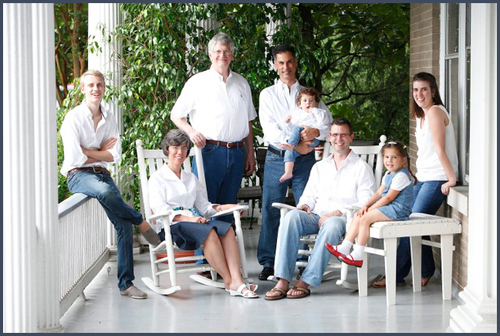
Leigh Ann Taylor, Joe Cobb & Family (Read their story below)
As we’ve been discussing homosexuality as part of our yearlong series on Sexuality & The Church, I’ve been surprised by how many readers have contacted me about their mixed orientation marriages, both past and present. So today I wanted to yield the floor to several people with first-hand experiences in this area, each with a different story.
Leigh Ann Taylor – Divorced (& Remarried)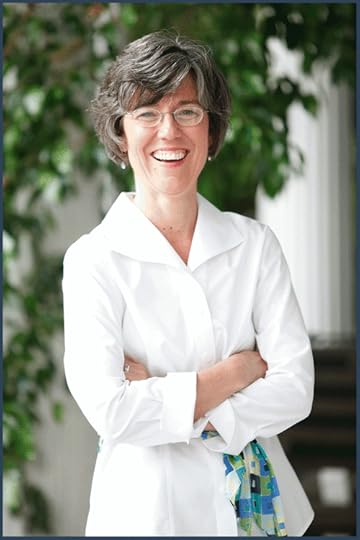
I had the privilege of meeting Leigh Ann when I visited Blacksburg, Virginia a few months ago and was struck by her warm, encouraging spirit. She and her ex-husband, Joe Cobb, have co-authored a book entitled Our Family Outing, which tells the riveting, heartbreaking, and hopeful story of a family that must face the reality that their husband/father is gay. When Leigh Anne met Joe, she never imagined that thirteen years into their marriage he would come out as a gay man. When Joe came out to Leigh Anne, he never imagined that thirteen years after their divorce, he and his partner James would choose Leigh Anne to be the godmother for their second child. I recently spoke with Leigh Anne:
First, share with us your story. When did you find out that your husband was attracted to men, and what happened after that?
Joe and I met when we were in seminary. We fell in love shortly after we met and were married less than a year later. Although I told him my whole dating history after we were engaged, he was vague about his. Thinking that there might be some abuse in his past, I didn’t probe. If I had, I would’ve learned that he’d been attracted to men since he was 10 years old and that he’d been in a sexual relationship with a man while he was in high school and college.
He kept his secret and we were married for 13 years. We became parents to two children, and we both had active careers in ministry. In our twelfth year of marriage, both of us were on the staff of a large church in Kansas. I was perpetually exhausted from juggling work and caring for two preschoolers, Joe was absent and totally focused on work. I became depressed. I got myself to the therapist and asked Joe to go too, so we could work on the emotional chasm in our marriage. I was completely unprepared for what he said to me after his first visit: "I don't know if I'm gay or straight and I've been with a man."
After I recovered from the shock of his confession, I was surprisingly relieved. I finally understood why our marriage was suffering, and it wasn't me. I said to Joe, "I'll stay with you as long as you’re in therapy to figure out if you're gay or straight. When you come to some peace about that, we'll figure out what to do about our marriage." I was hopeful early on that we would be able to continue our life as a couple, but as his therapy progressed, Joe became certain that he had to be with a man to be whole and I became certain that I could not stay married to gay man. Soon after we divorced, the kids and I moved to Virginia so I could have the support of my family as I started a new season in my life. Joe stayed in Kansas for two more years until he was asked to surrender his credentials as a pastor. He moved to Virginia and has been a regular part of our kid’s lives ever since.
Tell us about your current relationship with Joe and his partner.In the 15 years since our divorce, we’ve both remarried. Joe and James and my husband Hugh and I make a pretty awesome parenting team for our two children, who are now 19 and 21 years old. We get together in each other's homes for the kid's birthdays, milestones, and for holidays. Joe and James have two children, a son, 3 and a daughter, 5, who are James' biological children, born through a surrogate and an egg donor. I am James’ son's godmother. The older children adore the younger children and visa versa. My husband Hugh is a champ about it all, "I don't get it, but I don't have to. They're great guys and we're all part of the family."
One thing I loved about your book, Leigh Anne, is how you shared with readers some of the prayers you prayed as you journeyed through this experience of finding out your husband is gay, struggling through therapy, divorcing, and remarrying. They are beautiful prayers, applicable to all of us, even if our circumstances are different from yours. Tell us, what are some important things you learned about self-care through all of this?For the first time in my life, I learned that I really did have to put my own oxygen mask on before I could assist anyone else. I still remember that moment in the produce aisle, when I said to myself, "Avocados....I like avocados." I started in the vegetables aisle and moved right on up to a new bicycle and a fancy coat with a faux-fur collar! I stopped waiting around for someone else to "make me happy” and found that I was quite capable of doing that for myself. I was single for a long time and struggled with loneliness, but I learned from experience that I was far happier at home reading a novel than I was dating the wrong person. When I took care of myself, I was able to be more calm and loving toward the children and best of all, when I met my husband Hugh, I had a lot more to offer to our relationship than just my need.
The most important thing I did to take care of myself was daily journaling and prayer. I literally wrote my way to mental health in my prayer journal.
And do you have a favorite, go-to prayer that helped especially during this journey with Joe?"God be in my head and in my understanding. God be in my eyes and in my looking. God be in my ears and in my listening. God be in my mouth and in my speaking. God be in my heart and in my thinking. God be at my end and at my departing."
I prayed this at the beginning of the day, taking a deep inhalation when the first half of each sentence and a deep exhalation on the second. I imagined Jesus breathing peace into me, just as he did the disciples. This prayer was and is a lifeline for me.
Another memorable part of the book is when you share the letter you wrote to your children explaining to them why you and Joe were getting a divorce. It was touching, heartbreaking, and (surprisingly) hopeful. Are there any words of encouragement you can offer to parents in mixed orientation marriages for whom divorce seems inevitable?Joe and I actually made a new vow when we signed our divorce papers, "to speak and act in loving ways toward one another and about one another," for the sake of the children and for our own wholeness, for the rest of our lives. We released each other from the vows we made at our marriage with a blessing as we opened ourselves up to the possibility of new relationships, in which we could be whole. To those for whom divorce seems inevitable, is there a way you can release each other from your marriage vows but hold on to the love that drew you together in the first place? Can you imagine what your lives would look like if love and honor remain the cornerstone of your relationship?
What advice do you have for other women (or men) who are either considering entering into a mixed orientation marriage or have recently learned that they are in one?If you’ve recently learned that you’re in a mixed orientation marriage, please reach out with the truth of your story to someone you trust. A therapist is a good place to start. Be gentle with yourself and do the things that bring you comfort. Though this feels like a death, and it is in some ways, it’s not the end of everything. It’s a transition and there is life on the other side. It may not be the life you thought you were going to have, but it has the potential to be better than you ever dreamed. Pray. Pray. Pray. You are not alone.
Be sure to check out Leigh Anne and Joe's book, Our Family Outing .###
John – MarriedJohn and his wife Anna are both 30 and live in the Denver area. (Additional details have been withheld to protect their privacy.) You can follow John on Twitter here.
Share with us a little of your story. How did you and your wife meet, how long have you been married, and did you both know ahead of time that you were entering a mixed orientation marriage?My wife and I have been married for almost seven years. We originally met in high school. We were involved in the prayer club at the public high school and ended up going to the same youth group and church. At that point in my life I was aware of my sexual attractions for guys, but I was of the belief that it was sinful. I was "saved" when I was 14 and immediately starting sharing my testimony of "being set free from homosexuality". I was very enthusiastic in my newly found faith and really loved opening up, especially with other "on fire" Christians my age, about my story and my "struggles" with homosexuality. So my wife, Anna, knew this about me before we were ever involved in any kind of romantic relationship.
After knowing each other and being involved in the same church for several years, we started dating and got married. Basically, as a charismatic evangelical, I had an "ex-gay" paradigm for understanding my own homosexuality. My wife was of a similar faith at that time and I was able to communicate what I believed about this particular issue. So all in all, we sorta knew what we were getting in to, but neither one of us understood it or labeled it as a "mixed orientation marriage". We thought of it as a marriage between a man and woman as God intended, accomplished through his grace even in the midst of my "same-sex" attraction. It is probably important for you to know that about three years ago, our understanding and beliefs about homosexuality underwent a major shift. Our "faith" has also recently been deconstructed.
What are the biggest challenges of a marriage like yours? What are the biggest rewards?We have had several challenges along the way. They have ranged from my struggles with compulsive sexual behaviors at times (though I have never had sexual contact with anyone outside of our marriage nor have I put my wife/family at risk for any STDs), to run-of-the-mill communication problems. My wife has endured long seasons of dealing with my anxiety, depression, and detachment. I have at times felt stuck and unable to really be me.
On the other hand, we have also enjoyed so many things together. We have created three amazing and beautiful children. We have shared the joy of life's accomplishments together, we've faced questions and doubts together, we have had each other to cry with. I think our marriage offers us the unique ability to have a marriage that really doesn't have to follow some of the "heterosexual" rules and expectations--especially when it comes to gender roles. The best part, and bottom line, is that we love each other and enjoy "doing life" together.
What do you most want us to know about you, your marriage, and your spouse?What I most want people to know about me, in regards to my marriage, is that I am not living a lie. At the time we got married, I was as truthful with myself, my wife, and with everyone else, as I knew/understood to be at the time. Even now, my marriage to my wife is just as real and a part of me as my being gay. Sometimes I get asked why I remain married, and again, in addition to loving my wife, the truth is we are committed to each other. I understand true love to be the kind of love that endures all things and doesn't end. What I want everyone to know about my wife is that she is the most kind, loving, patient, gracious, intelligent person I know. I think she is beautiful, and I very much want to and enjoy spending my life with her. And no, my wife is not gay! We get asked that a lot. Also, we are aware that our marriage is not "typical" when compared to a heterosexual norm, and we are really okay with that and mostly really enjoy it.
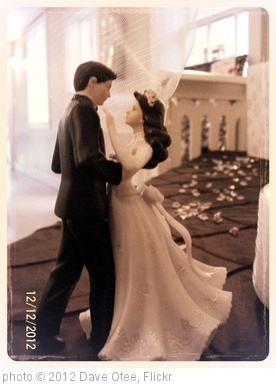
What advice do you have for other couples who are either considering entering into a mixed orientation marriage or have recently learned that they are in one?
I think in most cases, I would strongly discourage anyone from getting into this kind of marriage, if they aren't already in one. There are so many contributing factors for how folks end up here and, in my experience, it's usually because the gay spouse believes their homosexuality to be wrong and something they are either ashamed of and hide altogether or something they believe will change or go away. There is no reason at all, that I can think of, for a healthy whole gay person to enter in to a marriage with someone of the opposite sex.
It's a bit harder to offer advice to folks who have just discovered they are in a mixed orientation marriage, or are coming to terms with being in one, because the circumstances are always so different. What I have found is that each couple in this situation really has to do what is best for them...whatever that might be. I know some couples who continue to live together but sleep separately. Some have "open marriages," while others truly have no better option, given their circumstances, than to divorce. Basically, do the best you can with what you have. I happen to have an amazing wife, a beautiful family, and the best I can do is remain here with them and do my best to love them better and better each day.
###
"Doxy" - Divorced (& Remarried)"Doxy" is a longtime reader of the blog.
Share with us a little of your story. When did you find out that your husband was attracted to men, and what happened after that?
Some background may be helpful. My ex (I’ll call him “Paul”) and I attended the same fundamentalist Christian school and church, although we only began dating toward the end of college. (We both went to a large, urban public university in the southern city in which we grew up.)
I want to say up-front that Paul was my soul mate. We shared so many loves—ideas, music, politics. He always treated me as if he thought I was the smartest, most amazing person on the planet. He was firmly convinced that I could hang the moon if I wanted to—and because he believed so strongly in me, I slowly learned to believe in myself. This was a great gift, especially given what I would term the “anti-woman environment” in which we had grown up.
When we were dating, Paul confessed that he had had some sexual experiences with an older, male relative. He framed these experiences as “just playing around,” and the only reason he even confessed them was because this relative had become bitterly jealous of our relationship and was engaging in stalker-like behavior.
As part of my studies in college, I had read the Kinsey studies about how common homosexual experiences were among straight men—and I fancied myself something of a sophisticate at the ripe old age of 21. I figured Paul’s experiences were just a blip on the radar screen, and he did nothing to discourage that perception. We talked about fidelity and monogamy, and we seemed perfectly in sync on the need for both in marriage.
We were married in our home church in front of 400 people we had known for most of our lives. Then we promptly moved away so that he could attend law school and I could begin graduate school.
Over the course of the next three years, he became more open about the fact that he was attracted to men. He admitted that people in the church with whom he had discussed his same-sex attractions had urged him to get married and to avoid both gay people and pornography. They were sure that he would be “cured” if only he would commit himself to heterosexuality and ask for God’s guidance—but it wasn’t working.
At the same time, Paul was also very clear that he loved me and was happy in our marriage. But I began to feel more and more worried about our relationship—especially the sexual aspect of it. Our sex life had always been good, but I was increasingly troubled by the notion that maybe he was fantasizing about men when he was with me, that maybe he HAD to fantasize about men in order to be with me...
And then, as law school graduation loomed and we were planning our post-school life, the inevitable happened.
Paul fell in love with another man.
I started hearing a certain name more and more in his conversation. He got that glow you only have when you are newly enraptured with another human being. It seemed as if his feet hardly touched the ground, and he was distracted and giddy.
I had never asked Paul point-blank if he had been faithful to me during our marriage. I had gotten a law school education by osmosis, and one of the first things law students learn is “Never ask a question to which you don’t already know the answer.” The truth is that I hadn’t wanted to know—but I knew I couldn’t remain in a state of willful ignorance any longer.
So I screwed my courage to the sticking place and said: “How have you managed to remain faithful? Or have you?”
The answer hurt worse than I believed possible. Not only was he having an affair with the object of his affections, but it turned out that Paul had been having sex with other men the entire time we had been dating and throughout our marriage.
This was in the late 1980s, when the AIDS epidemic was decimating the gay community. An AIDS diagnosis was still considered a death sentence then, because there was only one treatment at that time (AZT) and it was more of a stop-gap measure than anything else. I had been having unprotected sex with my husband all the while. (For the record, both of us were—and continue to be—HIV-negative.)
I was devastated. I had honestly never suspected him of anything until he fell in love and couldn’t hide it anymore. The fear of getting AIDS paled next to the realization that I had been betrayed by the man I loved most in the world.
For the next few months, I teetered back and forth between the belief that we could somehow repair the damage and make our relationship work and the urge to bolt out the door and never look back. One minute I was tearfully begging him to stay with me. The next, I was feeling anger for which the word “rage” was a very pale description.
Paul actually didn’t need to be begged. He wanted to stay married—but he also wanted to have his boyfriend too. He had always been something of a sunny optimist, and he truly believed that the three of us could take a house by the sea and be happy together.
As much as I loved him, I could not be that person. I took a job in another city on the other side of the country, and our marriage was over.
What do you most want us to know about you, your marriage, and your ex?My marriage was a real marriage, and it was a very good relationship in many ways. My husband loved me. We had a good sex life. We were good for each other. Paul believed in me so much that he made me believe in myself, and I tried to return the favor. He was—and is—a sweet, kind, and generous man who is beloved by many.
But none of that was enough. Because no matter how much we wanted to make it work, the very core of his heart could never belong to me. He could not love me the way I needed and deserved to be loved by a husband. And I could not give him what his heart, soul, and body cried out for.
I was—and remain—angry at religious leaders who tell same-sex-attracted people that they can, and should, “choose” heterosexuality and marry an opposite-sex partner. I have no idea how my life would have been different if Paul had not been steered to marry me as a means of “becoming normal”—but I suspect that the heartbreak of another failed marriage 15 years later might have been avoided. In trying not to repeat the mistakes I made with Paul, I went too far in the opposite direction and found myself in a relationship that nearly drove me to suicide before God stepped in and helped me find my way out.
The price we both paid for our mixed-orientation marriage was high—and so much of the damage was caused by the church and by people claiming to speak for God. In all things, however, God was gracious—turning our personal tragedy into something redemptive and healing.
I came to recognize that being gay was not a choice, so I delved deeply into biblical scholarship and theology to find what the Bible had to say about homosexuality. The answer was: very little. Certainly nothing like the extent to which it talked about loving your neighbors and recognizing those who love God by the way they live their lives. Since I saw LGBT Christians being faithful to God, and I saw their relationships bearing such good and holy fruit, I could no longer sit by and let the whole world believe that all Christians think being LGBT is sinful. So I became an ardent LGBT ally and advocate. I hoped that social acceptance of LGBTs would lead to an acceptance of their relationships—and prevent anyone from ever again being coerced into a marriage to appear “normal.”
I may have lost a husband, but I did not lose my friend. Over time, Paul and I managed to build a very strong friendship on the wreckage of our marriage. We are still in regular touch with one another. We call, e-mail, and visit, and my children call him and his partner of 20 years “Uncle Paul and Uncle Steve.” We still joke—as we always have—that we will end up in the nursing home together, racing our wheelchairs down the hallways.
I wouldn’t be a bit surprised if we did.
What advice do you have for other women (or men) who are either considering entering into a mixed orientation marriage or have recently learned that they are in one?If you are a same-sex-attracted person who is considering entering a mixed-orientation marriage, I would say “Please don’t!” Being married will not make you straight. If you are primarily attracted to people of your own sex, you will be denying yourself the possibility of being TRULY known and loved, for all that you are.
And you will be denying your opposite-sex spouse the same thing. No matter how much you love each other, there will always be something missing for you both. Marriage is hard enough—entering into it when you cannot honestly commit to it mind, heart, soul, and body is a recipe for heartbreak for the two of you, your families, friends, and any children you may have.
(I am well-aware that there are bisexual people who can and do commit to an opposite-sex partner and remain faithful in marriage. My advice is directed to people who are primarily attracted to members of their own sex.)
If you are a straight person who is considering knowingly entering a mixed-orientation marriage, I would caution you to reconsider. You may not have experienced the terrible feelings of insecurity you can have when your spouse is out with other people of the same sex, while you sit at home and stare at the clock. You might not know how it can feel to be in an intimate moment with your spouse and to suddenly wonder if you are truly desirable. Both of those things were soul-crushing for me, and for other straight spouses I’ve talked to since then.
But mostly, I caution against it because you will be denying yourself the possibility of knowing the kind of all-out, no-holds-barred love I believe that God wants us to experience in marriage. You deserve that. We all do.
Finally, if you have recently discovered that you and your spouse have different orientations, my advice is: “Take your time before making any big decisions, and try to be kind to one another.”
Recently, I told a friend that, if Paul and I had been married for over two decades before I found out that he was gay, the decisions I would make might well be different. It was (relatively) easy to walk out at age 27 without any children. Would I do that now, at age 49 with two kids, two dogs, and a mortgage? I honestly don’t know.
I would ask: Do you both want to remain in the relationship? What matters most to both of you about your marriage? What will you do if your spouse says that having sexual relations outside the marriage is a part of the bargain? What can you live with? What is completely off the table?
These are not easy questions to answer. You will need a lot of support, whether you choose to stay together or not. There was no Internet when I learned my husband was gay, and I had to walk through the dissolution of my life by myself—now you can find thousands of others who are in your shoes and who are also looking for help and understanding. I would say the most important thing at first is don’t rush into anything. You need time to think, to weather those first storms of emotion, and to seek help.
###
Josh and Lolly Weed – MarriedIn addition, you may be familiar with Josh and Lolly Weed, a Mormon couple that has been open with the press about their mixed orientation marriage. They recently participated in an extended interview with the Mormon Stories podcast, which you can watch here.
[image error]video platformvideo managementvideo solutionsvideo player



April 28, 2013
Sunday Superlatives 4/28/13
I had a lovely time hanging out with the good people of Fairfax Community Church at The Blue Conference this weekend, including Kyle and Loretta Cooper who hosted a meal at their home.
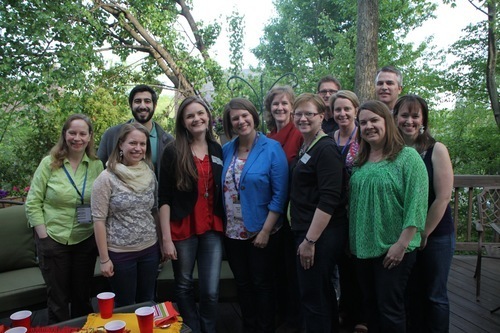
Before that, I was in Ft. Smith Arkansas, where I had the pleasure of experiencing 1) the incredibly gracious congregation of First Presbyterian Church, Ft. Smith, which included several 80+year-old-ladies who expressed interest in marrying Dan should I be open to a sister wife, 2) the famous, award-winning restrooms at the Ft. Smith airport (for real; they are ranked among the Top 10 Airport Bathrooms in the U.S.), 3) amazing conversation with a group women at Miss Anne’s Pie Place.
Mmmm….Pie….
On Tuesday, I’ll be speaking at Seattle Pacific University at 9:30 a.m. Let me know if you will be there!
On the Web…
Best Video:
Cat, On Roomba, Dressed As Shark, Chases Duck
Best List:
Brian McLaren lists the “one anothers” found in the New Testament
Best Response:
Ed Stetzer with “Evangelicals and Adoption: An Evil Obsession?”
“Joyce does get right that there has been a boom in evangelical adoption; shockingly, Christian parents do want to raise their children (adopted or natural-born) to one day know Christ as their savior; there are corrupt adoption agencies; and trafficking does happen. I also appreciate her recognition of some positive situations, such as the involvement of Saddleback Church in Rwanda. But based on the testimonies I've heard and read from those who are leaders in the evangelical adoption movement, these incidences of corruption are not normative, and this should have been acknowledged even more than it was. So I'd like to use my blog today to open the discussion beyond the fringes. I've asked some of the most well-respected evangelical authors and leaders involved in adoption to share their response to the claims made in the NPR interview, the Mother Jones article, and Joyce's book.”
Best Conversation:
Yale Divinity School hosts “The Future of Faith”
Best Observation:
NeoPrimitive with “People Are Not Topics: A Problem in Biblical Interpretation”
“My concern is that we go to Scripture looking for guidance on “topics,” be it the role of women in the assembly, household structures, the role of elders in the church, or even the big scary bugaboos of our day like gay marriage. We want to draw a line between the “topic” addressed in the Bible and the analogous “topic” that confronts us now. The danger is, we cease to view other people as people, and view them as a “topic,” which gives us a certain detachment. We then feel justified in making lofty pronouncements on the basis of “for the Bible tells me so,” without pausing to consider the human factor in it all. I don’t know that this is a positive development for the witness of the church. For one thing, it’s a lot easier to dismiss a topic than it is a person. You don’t worry as much about “as much as depends on you, live at peace with all topics.” Have you ever tried to “love your topic as yourself”? Furthermore, you can’t witness to topics: you witness to people. And people are not topics.”
Best Analysis:
“Hey John Piper, Is My Femininity Showing?”
“Women today, particularly Christians whose communities are influenced by men like Piper, may find their voices stifled when their influence and participation in so many spheres is limited to activities dubbed indirect and impersonal. Additionally, to view the opposite sex solely in these gendered, bodily terms tends to make women ashamed of their bodies, while men fail to see women fully, as human beings with bodies as well as souls and minds.”
Funniest:
The Onion with “Professor Deeply Hurt By Student’s Evaluation”
“'Maybe I’m just no good at this job,’ said Rothberg, recipient of the 1993 Jean-Foucault Lacan award from the University of Chicago for his paper on public/private feminist deconstructive discourse in the early narratives of Catherine of Siena. ‘Chad’s right. I am totally boring.’”
Coolest:
“Fish With Transparent Head Filmed”
Most Helpful:
Kristen Rosser with “Silencing Techniques”
“I think we all need to learn to recognize these techniques, so that when someone attempts to silence us, we can simply point it out and then get back to the substance of the issue. And if we're responsible for attempting to silence someone else, we need to see that we're doing it and back off. Issues need to be addressed on their own merits. Trying to shut someone up ultimately doesn't solve anything, and it's actually just another weapon in the arsenal of spiritual or verbal abuse.”
Most Honest:
Abigail Rine with “The Mother Wound”
“I know one thing: that would not have been me up on the mountain, knife raised high. I would have called God’s bluff from the start. And, if need be, I would have turned my back on him. That might make me a terrible Christian, but I don’t even feel like I’d have a choice in the matter. Motherlove is in my veins, and the force of it is as overpowering as God must have seemed to Abraham. This Motherlove is ruthless and all-consuming, in an Old Testament kind of way.”
Most Thoughtful:
Kristen Howerton with “The Kermit Gosnell Trial: We’re Asking the Wrong Questions”
“I think it’s time to stop questioning the media, and start questioning the Pennsylvania Department of Health, the Pennsylvania Department of State, and the Philadelphia Department of Public Health for their failure to shut this place down. Why are we focusing on what the media supposedly ignored when the very entities in place to assure this kind of thing never happens totally failed? There were numerous alarm bells on the way that should have warranted investigation, and yet he continued to practice. Is it because these departments were underfunded? Is it because the women involve were poor and uneducated and therefore effectively mute? What happened in the chain of accountability that allowed this to continue?”
Most Relatable:
Ava Neyer with “I Read All the Baby Sleep Books”
“ Co-sleeping is the best way to get sleep, except that it can kill your baby, so never ever do it. If your baby doesn't die, you will need to bedshare until college.”
Most Practical:
Sarah Bessey at Micha Boyett’s place with “Calm Your Heart”
“The funny thing about the simple and basic things is that they are true. If it’s true for a toddler, it’s probably true for most of us. It’s true that I need to go to bed at a reasonable hour, and I need to pray, and I need to eat real food, and I need to share, and I need to make time to rest. It’s true that I need to make quality decisions, and I need to use my words to love people. It’s true that I need to guard my gates from lies and evil and fear. And when storms and frustrations come, when I am suffering – imagined or real, when I am whiny or overstimulated or just plain ornery, when I am angry and feeling unsafe, when I am panicking and my heart is pounding and I can’t seem to get through the cloud of anger and fear and scarcity, I need to take a deep breath and I need someone to physically be present with me and I need someone to kneel on the kitchen floor, deep breathing, and I need to calm my heart to begin again, all over again.”
Most Insightful:
Zack Hunt with “An Angry God vs. a God Who Gets Angry”
“Now, when Edwards, or anybody else speaks of an angry God it is likely, hopefully, that at the beginning they only mean that God gets angry from time to time. However, what has happened, whether intentionally or not, is that over time this repetitive and never ending emphasis on God’s anger has become so ingrained in our minds that we can’t separate God from anger. An angry God becomes the dominant narrative of faith, and anger, rather than love, becomes the core characteristic of God’s nature. Worse yet, this God seems bound by his anger, as if he has no choice but to constantly be angry at mankind. But the diversity of God’s interactions with humanity in the Bible, not least of all the story of Jesus, shows us definitively that anger is not God’s fundamental nature.”
Most Likely To Be Called Women of Valor:
The Women of the Freedom Climb
Prototype: What Happens When You Discover You're More Like Jesus Than You Think?
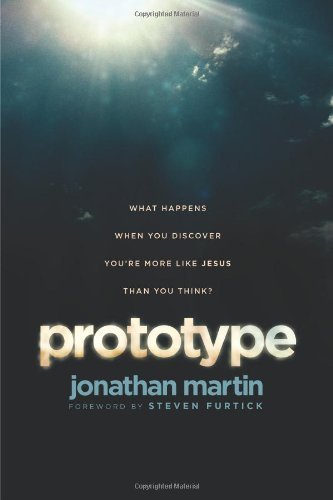
I LOVED this book! Look for a review soon.
On My TV…
Saw this on Netflix. Fascinating profile of artist Wayne White. Loved the connection to Chattanooga! (Language Warning)
On the Blog…Most Popular Post:
“God is pissed off and so am I”: Pastor Phil Jackson on Gun Violence"



April 26, 2013
A Cloth of Many Colors

I thought this was beautiful:
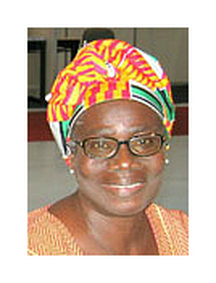
“Out of the leftovers of the fabric of history, women will make a cloth of many colors. This cloth will force both church and society to notice the variety of ways there are to be women. Women will demonstrate that the wonderful diversity of human character, accepted in the case of men, also exists among women. All women are not from one mold. Women do not have a common eye or voice or language. Out of the poverty of women’s presence in history many creative portraits of women’s history are coming alive…”
“…Power sharing is a prerequisite for the realization of co-responsibility. Created equally human, God made women and men stewards of creation and gave us authority to jointly fill the earth and manage it. The present state of the partnership of men and women in all cultures, on all continents, and in all churches, is in a state of sin. The one-sided development of the source of human authority has reduced stewardship to dominion, husbanding to control, and complementarity to the paternal determining the scope of being for the maternal. Patriarchy has distorted partnership…”
“…Women’s struggle for presence has gone on for centuries. Now the churches are being called to participate in the endeavor….The churches will show their solidarity with women when they demonstrate a new understanding of power and their willingness to share its exercise with the whole community of people. “
- Mercy Amba Oduyoye
Discovered in Mystics, Visionaries, and Prophets: A Historical Anthology of Women's Spiritual Writings, edited by Shawn Madigan
Read anything beautiful lately? Feel free to share!



April 25, 2013
“God is pissed off and so am I”: Pastor Phil Jackson on Gun Violence
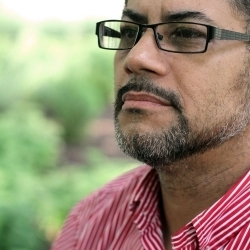
I ached as I stood over the casket preaching Marcus’s eulogy. I had known and worked with Marcus for 15 years before he was killed when four bullets found his body while stopping to buy diapers for his child. Sometimes in life, you are in the right place at the right time — and other times you find yourself in the middle of gun fight.
I told the family and friends who had gathered, “GOD IS PISSED OFF AND SO AM I. We are not supposed to be here today! We are to be celebrating college graduations, birthdays, and weddings, not mourning at the funeral of a 24-year-old son, dad, nephew, and cousin.”
The reality of my ministry in Chicago is that I have story after story of young men who have been a part of my world and life who have been both victims and shooters. Yet, every time tragedy strikes, the pain is the same.
If you have never held a mother, father, or crying child who has had to bury a family member because of gun violence, you might not understand the need to make the tough changes. If you have never seen the eyes of a student looking to you for hope as life seeps from their body or sat with a mother asking God why her child is gone — why her child had to die — I doubt you will understand the pain and the effect of what guns are doing on the streets of Chicago. If you have never had these experiences, you might not understand my sense of urgency when I say that I want to see the end of cheap and plentiful guns in my neighborhood.
There is a passage in Luke 7:11-16 in which Jesus stops a funeral and heals a child from death, brings him back to life, and gives him back to his mother. How I dream of that moment. But, I also believe I can work to stop the funerals in the first place and bring our young men and women back to Christ, back to their families, and back to their communities. This means working for personal transformation of young people’s lives. But it also means looking at the structures we live in and asking how they can change to make our streets a safer place to grow up.
There is an important theoretical discussion to be had about the Constitution and the application of the Second Amendment in our country today. But, I live in a world in which I cannot solely base my actions on constitutional theory. My thoughts about the protection of constitutional rights are always accompanied by my thoughts of protecting the young people in my neighborhood. My words about the kinds of legislation we should or should not have in our country must be words that I can speak to friends who might own guns and the parents of children who have been shot. I understand that there are responsible and law abiding gun owners in our country — and I want to respect that — but I hope they understand the stories of my neighborhood and my efforts to stop the shooting.
As a pastor, I know that simply passing laws isn’t going to end all violence. That’s why I do the work that I do to introduce young people to Jesus so their hearts and their lives can be transformed. But our sinful natures feed on opportunities to act on anger and lash out in violence. It is easier for human sin to take the form of a violent shot when you can walk through my neighborhood of North Lawndale on the Westside of Chicago and buy a gun in about 15 minutes. Right now, Congress is considering steps that could make this a little harder to do. Enforceable universal background checks, an end to gun trafficking, and prosecution of straw purchasers (when someone with a clean record buys a gun legally and then sells to someone who would pass a back ground check) are all commonsense measures we can take with action from our elected officials.
After the tragedy at Sandy Hook Elementary School, more than 4,000 pastors signed on to a letter initiated by 12 clergy in Newtown calling for commonsense solutions to reduce gun violence. You can join them.
If you’re not convinced by my words here, then I want to challenge you to take the next step. Come visit my neighborhood, come walk in my shoes, stand at a funeral with me — and then lets talk and pray together to see what God might be calling his church to do in the light of all these deaths.
- Pastor Phil
Pastor Phil Jackson, is part of the Emerging Voices Project and a pastor at Lawndale Community Church & The House Covenant Church
The House Development Corporation
Red Letter Christians



April 24, 2013
Christians and Humor: Thoughts on Making It Work
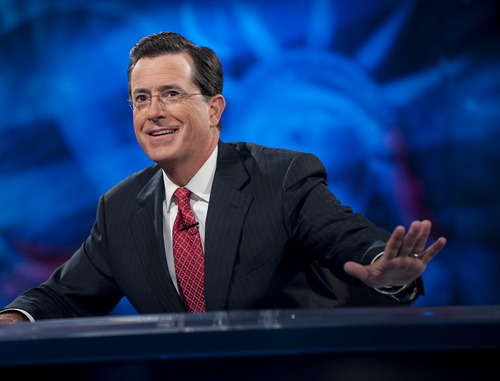
photo credit: Scott Gries (PictureGroup)
“It is a test of a good religion whether you can joke about it.”
– G.K. Chesterton
My favorite writer of all time is Mark Twain. The man was not only a brilliant humorist, but also a wise, prophetic, and at times searing cultural commentator. I often wonder what Twain would think about today’s culture of blogging, Twitter, and reality TV. He’s been dead my entire life, and yet somehow I miss him.
One thing Twain always got right was satire.
Satire, or any sort of humor for that matter, is tough to do right. But it’s too important not to do it at all, and I think Christians in particular can do a better job of using humor as a prophetic, yet disarming, method for sharing with vulnerability, challenging the powerful, and tearing down idols. We are surrounded by a great cloud of witnesses on this— from the prophets, to Chaucer, to Swift. Jesus too was a brilliant humorist, with a penchant for hyperbole—planks in the eye, camels through the eyes of needles, straining gnats and swallowing camels. (I love that God seems to find camels especially comical.)
So maybe we need to practice humor and satire a bit more often. As a writer who has attempted some satire myself, I’ve observed a few things about when satire works and when it doesn’t.
1. Humor works when it's directed toward yourselfBefore I wrote Evolving in Monkey Town, I re-read the best books from my favorite memoirists—Anne Lamott, Sara Miles, Donald Miller, David Sedaris, Ian Cron, etc.—to see what they all had in common. I jotted down notes as I went along, and among the four or five commonalities I observed was that each of these authors were consistently self-depreciating.
“I started writing sophomoric articles for the college paper,” writes Anne Lamott in Bird By Bird. “Luckily, I was a sophomore.”
Self-depreciating humor is disarming. It sets the reader at ease. It lets her know that you’re not the high-and-mighty-writer who has everything figured out; you’re just like her, taking it one day at a time. Self-depreciation, (without indulgent self-hatred, of course) makes you approachable, as a writer and a person.
So instead of writing a scathing blog post against your ex entitled, “10 Reasons You Can’t Get a Date,” try writing a funny, self-depreciating post about yourself entitled, “10 Reasons I Can’t Get a Date.”
2. Humor works when it's directed toward your own community or cultureYou can get away with a bit of humor when you're picking on your own community or culture, so long as it’s gentle and wry. This is why Jon Acuff’s “Stuff Christians Like” blog works. It’s why “Portlandia” works. It’s why Ian Cron’s chapter on growing up in Catholic school in Jesus, My Father, The CIA, and Me works.
Laughing at the idiosyncrasies of a shared culture bonds us together and helps us avoid taking ourselves too seriously.
While we can pick on our culture a bit, we should avoid picking on other people’s cultures. It makes sense, for example, for me to joke about the elevation of the Proverbs 31 woman in evangelical culture. [“In the evangelical Christian subculture, there are three people a girl’s got to know about before she gets her period: 1) Jesus, 2) Ronald Reagan, and 3) the Proverbs 31 woman. While the first two are thought to embody God’s ideal for all mankind, the third is thought to represent God’s ideal for women.” – A Year of Biblical Womanhood, p. 74] It would not, however, make sense for me to pick on interpretive biases within, say, Mormon culture or Jewish culture.
Humor about one’s community both strengthens that community (by pointing to shared experiences) and challenges it (by gently poking at its blind-spots and assumptions).
3. Humor works when it’s directed toward the powerfulThis is the true purpose of satire: to mock power. It is, truly, the language of the powerless. From the biblical prophets, to Chaucer’s Canterbury Tales, to Swift, to Twain, to Orwell to our beloved Jon Stewart and Stephen Colbert, satire works best when the targets are the powerful and elite—be they institutions or people.
Jesus’ sharpest comments were always directed toward the politically or religiously powerful. Always. Indeed, you could argue that Jesus’ entire life—from being born in a barn in the midst of a genocide, to hanging out with prostitutes and drunks, to healing on the Sabbath and touching the untouchables, to riding into Jerusalem on donkey rather than a war horse, to healing the ear of a Roman soldier after it had been cut off by Jesus’ allies—was a stinging indictment of religious and political power.
In this sense, I believe the book of Esther too can be read as satire, (or at least as including some fantastic instances of satire). King Xerxes epitomizes the imperialism, greed, excess, and senseless violence that Jews in exile were up against. And yet, routinely, the king and his court are portrayed as directionless buffoons, with no real substance. The emperor—the one that determines the timing of a genocide by casting lots— has no clothes. Power, even the scary kind, is an illusion. (And somehow, that makes it a little less scary.)
Satire only works when its most stinging indictments are directed toward the powerful. This is why attempts at satire fall on their face when they make the weak their target. For example, the writers at The Onion are usually great at satire, but they blew it with the Quvenzhané Wallis tweet, because it just doesn’t work when the subject of a c-word joke is a nine-year-old girl. Same goes for Daniel Tosh, who is a funny guy and all, but who probably should avoid making jokes about rape.
The rule of thumb: Pick on someone your own size, or bigger…never on someone smaller. And don’t take cheap shots.
In the tradition of Jesus, Christians should feel free to wisely, carefully, (and perhaps sparingly) employ satire to poke holes in our culture’s obsession with power—be it in the form of religious oppression, patriarchy, violence, fame, or corruption. And we should be eager to share the good news that, in the Kingdom that lasts, the guy on the donkey is Lord.
4. Humor works when it tears down idolsAs a kid, I loved the part of the story of Elijah and the Prophets of Baal when Elijah taunts his rival prophets and the lack of response from their gods by asking if perhaps Baal is busy traveling or sleeping or going to the bathroom. (It was one of those rare, delightful moments when bathroom humor was allowed in the Sunday school classroom. I think even the teacher was excited!)
Our culture is full of false gods and packed with idols: fame, notoriety, power, money, food, workaholism, legalism, “real men,” “true women,” the perfect body, the perfect home, the perfect relationship, the perfect life. And humor may very well be the most effective idol-smashing weapon we’ve got. Through humor, we can ridicule these idols of greed or indulgence or legalism, cut them down to size and expose them for what they are: empty promises, impotent objects of our worship. If ever there was a time to make our humor especially biting, it should be when it is directed toward idols….and our own propensity to bow to them.
Now, the opposite of mocking idols is mocking that which is truly holy. And this is where cynicism comes in. Cynicism perceives everything as fake and therefore mocks everything as fake. Cynicism begins with the assumption that there is nothing good or pure or holy in the world, that any form of sincerity should be regarded with suspicion. My generation is great at satire, but it is also pretty great at cynicism. I sense this within myself and struggle daily to keep my cynicism in check by cultivating the fruit of the spirit, nurturing my sense of wonder and gratitude, and practicing grace.
It would be awesome if I could get it right more often.
But there is grace…
As I said before, these are just general observations I’ve made about humor and satire through the years, and some principles I worked really hard to incorporate into A Year of Biblical Womanhood, which included quite a bit of both.
What about you? When have you seen humor/satire done well, and when have you seen it fall flat? What are some other principles to keep in mind.


April 23, 2013
Ask Jennifer Knapp….

If you were anything like me, you spent many a weekday morning singing along to Jennifer Knapp’s “Faithful to Me,” “Hold Me Now,” and “A Little More” as you got ready for another day of high school. The Grammy-nominated folk rock musician’s earthy, raw music has always given shape to my hopes and frustrations.
Jennifer’s first three albums—Kansas, Lay It Down, and The Way I Am—sold over a million copies. After taking a 7-year hiatus, Knapp announced in September 2009 that she was returning to music. On May 11, 2010 she released her newest album Letting Go with the single "Dive In".
Jennifer spent her Christian music career challenging religious cultural stereotypes both on and off stage. Candid and compassionate in heart, rock-n-roll in her confrontational style, Jennifer’s impact on Christian audiences took a new turn in 2010 when she made public her long-standing same-sex partnership. The revelation sparked much public debate amid cries for immediate rejection from Christian music leaders, retailers and fans alike. Jennifer currently advocates on behalf of LGBT Christians through Inside Out Faith. Having experienced, first hand, the devastating effects of rejection and judgment, Jennifer knows full well the challenges of being “out” in certain faith communities. However, it is in the sharing of her journey through story, music and conversation that she has discovered the healing that comes from breaking the silence.
It’s such an honor to have Jennifer on the blog to respond to YOUR questions.
You know the drill. If you have a question for Jennifer, leave it in the comment section. Be sure to utilize the "like" feature so we can get a sense of what questions are of most interest to you. After 24-hours, I'll pose seven of the most popular questions to Jennifer and post her responses next week. Ask away!



April 22, 2013
Sexuality and the Christian Body, Part 2: “Grace & Election” (by Richard Beck)
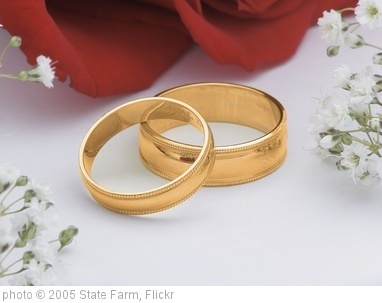
A couple of week’s ago, I shared Part 1 of our friend Richard Beck’s thoughts on the book, Sexuality and the Christian Body by Eugene Rogers. Richard has graciously allowed me to share Part 2 (which originally ran on his blog) today, and I am so grateful. Really. Richard has been incredibly generous to share these posts in their entirety with us. (You may want to thank him next time you're on his blog.)
As an aside, I hope this post will also inspire you to check out Rowan Williams’ important essay The Body’s Grace . I’ve been told on multiple occasions that we can’t have a series on Sexuality & The Church without discussing that essay, which is exactly what Richard does here, in the context of Rogers’ book.
For those who feel a bit overwhelmed by reading two deep theology posts, Richard has distilled much of the theological content in a compare and contrast format in a post on his blog entitled “Same Sex Marriage in the Image of God?” There he presents both sides of the debate clearly, simply, and charitably.
Sexuality and the Christian Body, Part 2: “Grace & Election”by Richard Beck
A second major theme in Eugene Rogers' book Sexuality and the Christian Body is his interaction with and elaboration upon Rowan Williams' essay The Body's Grace. If you've not read The Body's Grace many consider it to be the most significant theological treatment of human sexuality in the 20th Century. You can decide that for yourself. Regardless, agree or not, The Body's Grace is considered required reading for theology students taking up the subject of human sexuality. So, before getting back to Rogers it might be helpful to sketch out some of the main moves inThe Body's Grace.
Williams opens the essay with the question: "Why does sex matter?" One part of the answer is negative: Sex matters because it is where our personhood is most exposed and vulnerable. This makes sex both tragic and comic:
Nothing will stop sex being tragic and comic. It is above all the area of our lives where we can be rejected in our body entirety, where we can venture into the "exposed spontaneity" that Nagel talks about and find ourselves looking foolish or even repellent, so that the perception of ourselves we are offered is negating and damaging (homosexuals, I think, know rather a lot about this). And it is also where the awful incongruity of our situation can break through as comedy, even farce...
[Sex] is potentially farcical--no less for being on the edge of pain.
The reason sex can be so painful and tragic is that we expose ourselves to the perceptions of another. And this exposure carries great risk, psychically and spiritually. Consequently, we may choose to remove our sexuality from the communal sphere where there is so much risk, vulnerability, and exposure. Sex, then, becomes solitary and non-relational. Williams suggests that this retreat into isolation, removing sex from the perceptions of others, may be the best theological definition of sexual perversion:
"Sexual "perversion" is sexual activity without risk, without the dangerous acknowledgement that my joy depends on someone else's, as theirs does on mine. Distorted sexuality is the effort to bring my happiness back under my control and to refuse to let my body be recreated by anther person's perception. And this is, in effect, to withdraw my body from the enterprise of human beings making sense in collaboration, in community, withholding my body from language, culture, and politics."
In light of this, healthy sexuality is allowing my personhood to be shaped by the perceptions of others. Sex is to enter into a communal space where there is giving and receiving, a mutuality, a sharing of selves and perceptions. This is why sex matters. It is a location where we discover our humanity through our being with others. Williams writes:
"I can only fully discover the body's grace by taking time, the time needed for a mutual recognition that my partner and I are not simply passive instruments to each other. Such things are learned in the fabric of a whole relation of converse and cooperation; yet of course the more time taken the longer a kind of risk endures. There is more to expose, and a sustaining of the will to let oneself be formed by the perceptions of another. Properly understood, sexual faithfulness is not an avoidance of risk, but the creation of a context in which grace can abound because there is a commitment not to run away from the perceptions of another."
I'd like to grab a part of Rogers' argument at this point. What Williams is suggesting is that human sexuality is akin to a spiritual discipline. More, Rogers suggests that human sexuality is a form of monasticism, of living in close community, exposing our bodies and personhood to the perceptions of others and allowing those perceptions to affect and shape us. In both monasticism and marriage there is a "mutual kenosis," a shared self-emptying. Here is Rogers on this point:
"Marriage, like monasticism, allows eros and the body to mean more...[M]arriage shares with celibacy the end of sanctifying the whole person through the body, of permitting the body something more to be about, something further to mean, something better to desire, until finally it gets taken up into the life in which God loves God. In this process of desiring ever more, one incidentally or intentionally gives up--lets go of, gets rid of--the petty things that one used to want, and in that way the life of ever-greater desire is one of asceticism, and asceticism in which self-control serves self-abandonment. In this way too the end of marriage and monasticism is one."
This might seem to be an odd claim, that sexuality and celibacy are two sides of the same coin. That eros can be a form of asceticism. But if you've ever been married and have tried to "work out" life in the sexual sphere I'm sure you can understand. Rogers' description of mutual kenosis is very apt. More from Rogers describing the relationship between eros and agape:
Both these forms of community--monasticism and marriage--require time to complete the transformation of human beings by the perceptions of an other. Both the married and the monastic need somebody who loves them to call them on their faults from whom they cannot easily escape. The transformation is not only, or even primarily, the experience of falling in love (eros), but that is the intensity and the clue to the importance of something else: the experience of living with someone, the neighbor, who won't leave one alone (agape).
This view of human sexuality fits very comfortably with scripture. As Paul writes in 1 Corinthians: "The husband should fulfill his marital duty to his wife, and likewise the wife to her husband. The wife's body does not belong to her alone but also to her husband. In the same way, the husband's body does not belong to him alone but also to his wife."
Our bodies are not our own. They are "community property." I share my body with my wife. And it doesn't end there. My body belongs to the community of faith. I don't wholly control my own time, money, efforts, or talent. The community has a claim on me. Ultimately, because these loves--for my wife and for the world--are simply reflections of my love for God. As Paul writes: "You are not your own; you were bought at a price. Therefore honor God with your body."
Monks are "not their own." And neither are the married. As Rogers notes, monks learn this lesson directly: By giving up eros for the love of God (agape). The married discover this more indirectly: Eros demands that I make my body available to the other (agape). But the lesson is the same: You are not your own.
Now all this talk about discipline, kenosis, monasticism and asceticism might sound kind of dreary. But this is where the language of grace comes in. As both Rogers and Williams note, marriage doesn't make any sense, theologically, without the pre-existent language of grace. Love, sex, marriage, friendship. These only mean what they mean because of God's grace. So what is grace? Williams offers this vision:
Grace, for the Christian believer, is a transformation that depends in large part on knowing yourself to be seen in a certain way: as significant, as wanted.
The whole story of creation, incarnation, and our incorporation into the fellowship of Christ's body tells us that God desires us, as if we were God, as if we were that unconditional response to God's giving that God's self makes in the life of the Trinity. We are created so that we may be caught up in this, so that we may grow into the wholehearted love of God by learning that God loves us as God loves God.
The life of the Christian community has as its rationale--if not invariably its practical reality--the task of teaching us to so order our relations that human beings may see themselves as desired, as the occasion of joy.
I mentioned in Part 1 that I found Rogers' book a wonderful read in relation to my own marriage. A part of that was Rogers reminding me of Williams' account of grace, of finding myself in my marriage to be "an occasion of joy." True, it's not always like that, but if you've ever experienced grace you know the feeling. Just think of the last time--whether with friends or family--where you, in your personhood, were greeted and experienced as an occasion of joy. That feeling is grace. And the life, death, and resurrection of Jesus is aimed at teaching us this: That is how God feels about you. You are God's occasion of joy.
As physical creatures, we tend to experience this grace in the presence of others. And that is what I was talking about above. These human experiences--love, laughter, sex, friendship--only make sense in light of God's grace. God's grace animates these experiences, we know ourselves to be loved by God through these experiences.
And this is where the body's grace comes in. Can my physical body be experienced as "an occasion of joy" by another? And for myself? Again, recall how risky sex can be. Can grace be experienced here, in the physical sphere, where I am maximally exposed--physically, emotionally, spiritually?
Yes it can, but again, this grace must participate in the life of the Trinity. There must be mutuality and communion. And when this mutual kenosis is present, Williams writes, we find in sexuality an experience of grace, the body's grace:
" For my body to be the cause of joy, the end of homecoming, for me, it must be there for someone else, must be perceived, accepted, nurtured. And that means being given over to the creation of joy in that other, because only as directed to the enjoyment, the happiness, of the other does it become unreservedly lovable. To desire my joy is to desire the joy of the one I desire: my search for enjoyment through the bodily presence of another is a longing to be enjoyed in my body.
In this, sex might be the quintessential form of spirituality: Eros (desire) can only be experienced by agape (self-sacrifice). True love is only experienced when my joy is achieved by surrendering to your joy. In this, the sexual union models the life of the Trinity. The love of the Son is given to the Father and the Father gives it back to the Son through the Spirit. Each empties into the other, an eternal flow of self-emptying love--back and forth, back and forth, back and forth. The tides of kenosis and love. Gifts given and received--back and forth, back and forth, back and forth. Father, Son and Spirit finding each other to be occasions of joy.
This, then, is a sketch of Williams' essay The Body's Grace. And what it provides us with is a vision of how sexual love reflects the Imago Dei. Sex of this nature is holy, a participation in the Triune life of God. In his book, Rogers takes this Trinitarian vision of human sexuality and then folds it into a theological account of marriage.
We might say that a part of what Rogers is doing is asking a question similar to the one Williams asked. Where Williams asks, "Why does sex matter?" Rogers is asking "Why does marriage matter?"
Rogers' answer also follows the path of grace. Marriage is an experience of grace, of being found to be an occasion of joy. And as with sex, this marital grace can only make sense if a pre-existing language of grace precedes it. God's marriage to his people is what makes sense of human marriage.
So how does the bible describe the grace found in "God's marriage"?
Rogers argues that it is fundamentally described as a matter of election. God's grace is experienced in God's own choosing of a people. God chooses Israel to be his bride. And in this choice Israel is found to be an occasion of joy. Israel experiences God's grace.
In short, what makes marriage a reflection of God's nature is that it models God's election: I choose you.And again, this is where my own biography wells up. Jana and I have a little exchange we share when we are experiencing grace in our marriage. I say, "Thanks for saying 'yes.'" And she responds, "Thanks for asking." We experience grace because it is an occasion of joy to be chosen. To be selected. And this grace is not just for the married. We experience the grace of God's election whenever we are chosen to be an occasion for joy, by friends and family. As Williams describes, this is grace because we feel desiredand wanted.
Marriage, then, reflects the nature of God in that it participates in (incarnates) God's election and marriage to Israel. This is the grace of marriage: I choose you.
If this is so we can see why procreation isn't what makes marriage a marriage, theologically speaking. No doubt reproduction is a part of human sex. But marriage? Marriage is about God's election of Israel. As Rogers notes, it would be sort of odd to model Christian marriage after Adam and Eve. Do we really want marriage modeled after those two? Ummmm. No.
So Adam and Eve aren't the model for marriage. No, God and Israel are the model for Christian marriage.And that marriage is one of election and covenant faithfulness. And, interestingly, the best biblical example of this faithfulness, read aloud in countless marriage services, is Ruth's pledge to Naomi:
Don't urge me to leave you or to turn back from you. Where you go I will go, and where you stay I will stay. Your people will be my people and your God my God. Where you die I will die, and there I will be buried. May the LORD deal with me, be it ever so severely, if anything but death separates you and me.
The fact that we use this pledge for marital covenants (!) highlights that this is what marriage is about. God's election and covenant faithfulness--incarnated in Ruth's pledge to Naomi--is what makes a marriage a marriage.
More, as noted in my last post, if we recover our identity as Gentiles (as Rogers insists) we soon realize that we are not a part of this marriage. God married Israel, not us. Yahweh is not our God. Yahweh is Israel's God. So, as Paul helps us see, we have to be adopted into this family. And "in Christ" we are adopted. We are "grafted in."
This identity as "adopted children" puts further strain on attempts to place reproduction at the center of Christian marriage. We are not God's "children of the flesh." We are not circumcised. We've been adopted through baptism. And what this again highlights is God's election. His choosing us. What makes us family isn't DNA but the free choice of God. Also known as grace. And this is how family is understood in the church: We are not biological relatives, but we are all "family" through God's choosing us in Christ.
And according to Rogers this understanding goes a long way in explaining why "non-standard" families can be full reflections of the Imago Dei: Sterile couples, step-families, adopted children, gay marriages, etc. These are all marriages and families that reflect the life of God. They are not incomplete or failures. They fully reflect the Imago Dei. Why? Because they model God's marriage to Israel, God's election:
I choose you.
And that is an occasion of joy.
***
Be sure to check out “Same Sex Marriage In the Image of God?” over at Richard's place and the rest of our Sexuality & The Church series here.
Richard’s blog, Experimental Theology, consistently falls into my personal Top 5 list and I can’t recommend it enough. Richard is a psychologist, and so his reflections on theology, the Bible, church, community, and spirituality always include some new angle I never considered before. (For example, recently he’s been discussing “the impossibility of Calvinistic Christian psychotherapy!”) I had the privilege of meeting Richard and his awesome wife Janna when I visited Abilene Christian University a few years ago. Richard is Professor and Department Chair of Psychology there. He and Jana have two sons, Brenden and Aidan. Richard's area of interest--be it research, writing, or blogging--is on the interface of Christian theology and psychology, with a particular focus on how existential issues affect Christian belief and practice. Richard's published research covers topics as diverse as the psychology of profanity to why Christian bookstore art is so bad. His books include Unclean: Meditations on Purity, Hospitality, and Mortality and The Authenticity of Faith: The Varieties and Illusions of Religious Experience.
Go subscribe to Richard’s blog now. You will thank me later.



April 19, 2013
Giveaway Winners + a picture of cheeseballs

I enjoyed reading all your comments about food yesterday! I found my head nodding and stomach growling as you shared your thoughts on hospitality, just eating, ice cream, and cheese snacks. (You people are obsessed with Cheeseballs and Cheetos... and I totally get it; I included a photo because I love you.) Through random.org, I selected three winners to receive copies of Bread & Wine by Shauna Niequist and Eat With Joy by Rachel Marie Stone. I thought it would be fun to share their responses to the three questions: 1) favorite guilty pleasure, 2) go-to weeknight meal, 3) biggest hang-up or struggle when it comes to food/hospitality:
Comment #25 - Brooke F.
1) cheeseballs. the round cheeto-esque kindComment #56 - Heather Yokley-Kern
2) tacos
3) finding the time
1. chocolate cake with chocolate icingComment # 188 – Karen
2. macaroni & cheese and hot dogs
3. I love sweets and when having people over I tend to go overboard with having too many choices and too much of everything!
1. Andes Mints in Chocolate Molted Lava Cakes...to die for!
2. Chicken Enchilada Casserole...super easy and most folks love it
3. Setting a pretty table......
I’ve contacted the winners via email, so if you see your name here, check your inbox.
If you didn’t win, I recommend picking up a copy of one or both of these excellent books:
Bread & Wine by Shauna Niequist
Eat With Joy by Rachel Marie Stone



April 18, 2013
Let’s talk about FOOD! (includes a giveaway)
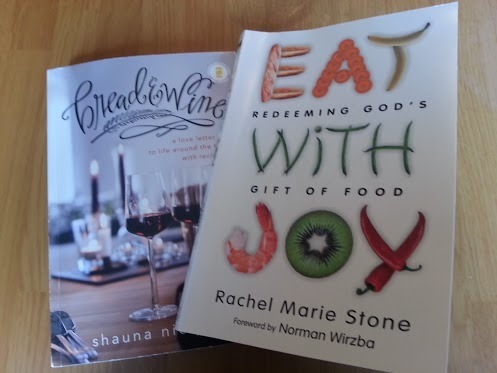
I love to eat.
I’m the kind of person who will make a scene at a restaurant, raving loudly about the to-die-for truffle sauce until everyone in the room has agreed to order the same meal for themselves. I associate seasons with food (winter = pot roast, spring = strawberry salad, summer = burgers on the grill, fall = pumpkin EVERYTHING), and mark special occasions with food (birthday = ice cream, book deal = champagne, Christmas Eve = homemade white lasagna). Those who have read A Year of Biblical Womanhood know that I recently connected with my inner chef, so when I have time, I enjoy the challenge of working my way through a long list of complicated ingredients and directions to produce a from-scratch soup, roast, pie, or casserole.

matzah toffee (with a side of head covering)
But like most Americans, my relationship with food has a dark side. I tend to “graze” on snacks in the kitchen when I get stressed out or depressed. I often eat absently, in front of the TV or laptop. I count calories and then feel guilty when I’ve consumed too much. (I’m looking at you, Einstein Bros Bagels in Concourse E of the Charlotte Airport.) I don’t have people over for dinner often enough, and when I do, I get so stressed out about making everything perfect that it’s unlikely I’ll do it again anytime soon.
So when I learned that two of my favorite writers—Shauna Niequist and Rachel Marie Stone— were releasing books on the topic of food, I had to get my hands on some copies. And let me tell you, these books didn’t disappoint. I gobbled up every word! (Yikes. Sorry ‘bout that; I couldn’t resist.)
First, some thoughts on Shauna’s book, Bread & Wine…
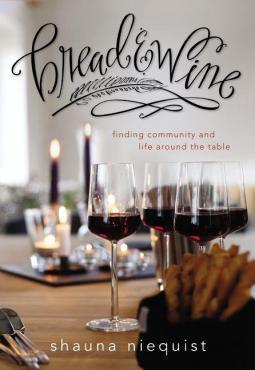
Shauna, author of Cold Tangerines and Bittersweet, is an amazing writer—so talented you hardly notice the precision and craftsmanship that goes into every sentence, every paragraph, every chapter. Her past memoirs have touched on love, loss, balance, beauty, mindfulness, and faith, and in Bread & Wine, Shauna pulls these themes together once again, but in a series of reflections about her true passion: life around the table.
“My prayer is that you’ll read these pages first curled up on your couch or in bed or in the bathtub,” she writes, “ and then after that you’ll bring it to the kitchen with you, turning corners of pages, breaking the spine, spilling red wine on it and splashing vinegar across the pages, that it will become battered and stained as you cook and chop and play, music loud and kitchen messy. And more than anything, I hope that when you put this book down, you’ll gather the people you love around your table to eat and drink, to tell stories, to be heard and fed and nourished on every level.”
I expected this book to be wise, funny, and vulnerable…because Shauna always is. But I was surprised by how practical I found it, how many sentences I underlined and notes I made. Not only does the book include easy, practical recipes at the end of each chapter, it also includes a really helpful appendix with entertaining tips, sample menus, and a pantry list. It’s the perfect book to inspire you to open up your table more often and help you become a better host.
In several chapters, I felt certain Shauna was reading my mind, speaking directly to my deepest insecurities related to food, body image, hospitality, even motherhood. (I cried on an airplane while reading “On Tea and Pajamas,” it so perfectly captured my life at the moment.) Another fantastic chapter is entitled “Open the Door,” and it begins with what Shauna acknowledges is a generalization, but which certainly rings true in my own life: “It seems to me that women typically experience shame about two things: their bodies and their homes.”
She describes how embarrassed she felt when a friend stopped by unexpectedly, in the middle of a writing session, when Shauna’s house was a mess and she was dressed her typical writing attire—no makeup, hair in a ratty bun, crooked glasses, half-zip, and sweatpants.
“I felt within myself the desire to shoo her out, to hide, to keep her from the disorder that is my real, actual life some days,” Shauna writes.
Shame like this can keep us from inviting our loved ones to the table, she says. “This is why the door stays closed for so many of us, literally and figuratively. One friend promises she’ll start having people over when they finally have money to remodel. Another says she’d be too nervous that people wouldn’t eat the food she made, so she never makes the invitation. But it isn’t about perfection, and it isn’t about performance. You’ll miss the richest moments in life—the sacred moments when we feel God’s grace and presence through the actual faces and hands of the people we love—if you’re too scared or too ashamed to open the door. I know it’s scary, but throw open the door anyway, even though someone might see you in the terrible ugly half-zip.” (p. 109)
Some other great lines:
From “Jazz and Curry”—
“In cooking as in life, there are some non-negotiables, but not nearly as many as you think.”
From “On Bread and Wine”—
“….Part of becoming yourself, in a deeply spiritual way, is finding the words to tell the truth about what it is you really love. In the words of my favorite poet, Mary Oliver, it’s about ‘letting the soft animal of your body love what it loves.’”
From “Hungry”—
“I used to think that the goal was to get over things—to deal with them once and for all, to snap an issue closed like slamming a locker door, washing my hands of it forever and always. What I know now after all these years is that there are some things you don’t get over, some things you just make friends with at a certain point, because they’ve been following you around like a stray dog for years.”
From “Morning, Noon, and Night”—
“…Love isn’t something you prove or earn, but something you receive or allow, like balm, like a benediction, even when you’re at your very worst.”
From “Hungry”—
“Part of being a Christian means practicing grace in all sorts of big and small and daily ways, and my body gives me the opportunity to demonstrate grace, to make peace with imperfection every time I see myself in the mirror. On my best days, I practice grace and patience with myself, knowing that I can’t extend grace and patience if I haven’t tasted it.”
I highly recommend this book. It’s entertaining, inspiring, challenging, and (at least in my experience), a sort of antidote to cynicism that will help connect you with what’s most real and most important.
Eat With Joy: Redeeming God’s Good Gift of Food by Rachel Marie Stone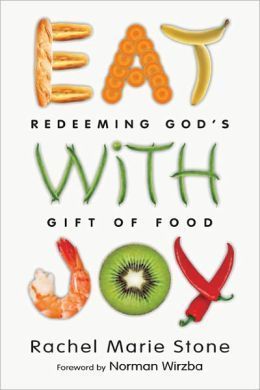
While Bread & Wine is a memoir that focuses on life around the table, Eat With Joy delves more deeply and directly into issues related to the theology of eating, touching on everything from food anxiety and eating disorders, to poverty, to obesity, to just and sustainable eating, to hospitality, to mindfulness, to communion.
Rachel Marie Stone (who you may know as a popular writer over at Her.Meneutics) has written a thoughtful, impeccably-researched, and practical book that cites a movie in one paragraph, a Bible story in the next, a poem in the following, and a scientific study in the next. This lady must read….A LOT! My writing journal is now packed with new quotes and insights I plan to use later. (For example, in Chapter 3 Rachel notes that “our English word companion comes from the Latin for ‘with’ (com) and ‘bread’ (panis)—a companion is one with whom you eat your bread.”)
To give you a sense of this small book’s breadth: Chapter One—“Joyful Eating”—introduces the topic of food and explores how food is meant to be enjoyed as a living metaphor for God’s sustaining love for his people. Chapter Two—“Generous Eating”—looks at the importance of not only serving but also eating with the “least of these.” (I love that Rachel highlights the importance of not only “feeding” people, but also dining with them, in community together.) Chapter Three—“Communal Eating”—further explores the importance of community in eating, with insights into the significance of shared meals in Scripture. Chapter Four—“Restorative Eating”— looks at the healing effects of communal eating, particularly as it pertains to addressing eating disorders. (Fascinating chapter!) Chapter Five—“Sustainable Eating”—addresses head-on the many injustices in food production in the U.S. and around the world. Chapter Six—“Creative Eating”—looks at cooking and eating as a form of culture-making with potential for worship. And Chapter Seven—“Redemptive Eating”—beautifully ties together all these themes and provides practical suggestions for ways to practice joyful eating in the real world.
Eat With Joy also includes recipes at the end of each chapter (we’re going to be eating well at the Evans home!) as well as beautiful mealtime prayers, collected from around the world and from various traditions, which alone are worth the price of the book. One of my favorites:
Behind the loaf is the snowy flour;
Behind the flour is the mill;
Behind the mill is the sun and shower,
And the wheat and the Father’s will.
Amen.
This was one of those rare books that is both carefully and passionately written. It’s hard to believe this is Rachel’s first book; I suspect it will not be her last!
These books serve as perfect companions to one another, and I’m so glad I read them together. I feel like ditching the internet for a few days so I can chop up some onions, bake some bread, try a new recipe, and invite some friends over.
(One quick note: If you are struggling financially, you may find elements in each book, particularly Bread & Wine, frustrating. I too have been in the place where I was shopping at Wal Mart because it’s all I could afford, working ramen noodles into the weekly menu more often than I preferred. Stories and anecdotes about travelling the world and enjoying European cuisine, buying organic, joining a CSA, or picking out fine wine for guests may make you feel like true hospitality and joyful and just eating are little more than dreams other people get to fulfill. Thankfully, both authors go out of their way to offer practical suggestions that apply to all of us, no matter our socioeconomic situation. So, if that’s where you’re at, try not to let the stories detract from the message.)
We have three copies of each book to giveaway! So I’ll pick three winners to receive BOTH Bread & Wine and Eat With Joy. (Note: If you win, the books will arrive in your mailbox separately, as they come from two different publishers.)To enter, leave a comment with:
1) Your favorite guilty pleasure food (mine = coffee-flavored ice cream!
2) Your go-to weeknight meal (mine = enchiladas or tacos)
3) Your biggest hang-up or struggle when it comes to food or hospitality (mine = PERFECTIONISM!)
Through random.org, I will choose three winners and contact them. (Be sure you’re signed into DISQUS with an email address.) Contest runs through Friday, April 19 at 3 p.m. EST, at which point I will notify everyone of the winners.
In the meantime, I hope you find the time this week to gather around your table and eat with joy!
***



Rachel Held Evans's Blog
- Rachel Held Evans's profile
- 1710 followers



